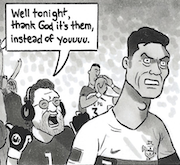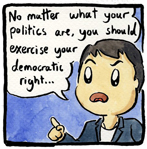|
ecureuilmatrix posted:
Actually, yes. Mustard gas is actually more of a thick vapor than a true gas like, say, Chlorine and Phosgene, and it condenses very easy under the right conditions. Since it's a blistering agent, rather than an asphyxiant like those other two, this helps it cling to exposed flesh and do its nasty business. Not to say it won't gently caress your lungs right up if it gets in there, of course. Despite its fearsome reputation, mustard gas tended to disable much more than kill (though it surely did claim a lot of lives), since those exposed would naturally tend to remove themselves from where it happened to be due to the horrible chemical burns, thus limiting their overall exposure. \/\/Whoops, my mistake. Captain_Maclaine fucked around with this message at 22:51 on Mar 6, 2014 |
|
|
|

|
| # ? Jun 9, 2024 20:42 |
|
Mustard gas is a blister agent, not a nerve agent.
|
|
|
|
Taja posted:Love WW1 & WW2 Propaganda Posters, just a few from my blog! Pretty sure these are all WW1 ones. Oh man, this just reminds me: a few months ago, I read Tony Collins' Social History of English Rugby Union (Collins is a professor of sociology currently at, I want to say, De Montfort Uni, one of the best writers about the intersection of history, class, and sport, and a RL man like myself) and he spent a really interesting chapter talking about how union's entire structure--its roots in the public schools and middle classes, heavy reliance on international play at that time and thus on proving English superiority, and semi-accepted belief that it produced the best fighting men--combined with the fact that due to their backgrounds many of the union names that signed up were given pretty much instant commissions, basically meant that pretty much entire clubs signed up en masse to fight for King and country--and of course, the vast majority of them (something like all but one of the pre-war England national squad, for example: a more complete list is here https://en.wikipedia.org/wiki/List_of_international_rugby_union_players_killed_in_action_during_the_First_World_War) died in the fight. You can still go to most English union clubhouses/grounds and see big memorials to their players lost in WWI and to this day more than a few play memorial games for those that died in the trenches, which he points out you won't see much of at rugby league clubs (although they themselves had a large number of players enlist), something he believes is due to the fact that death was a lot less of a regular occurrence amongst the middle-class milieu that the union clubs inhabited, whereas in places like Castleford or Widnes or Featherstone young men would pass away all too frequently due to mine/factory accidents or illnesses that people in Richmond or Bedford or Northampton just didn't get as much. Also, fun fact: the world wars were, until 1995, the only time when rugby union and rugby league players could play on the same team/against each other without fear of sanction from the RFU! Yes, due to the limited number of players available back home the union governing body (which until professionalism was legalized in 1995, would ban a player from union for even being spotted in the grandstand at a league match) allowed its players to play on regimental teams that would occasionally play under what was then known as the Northern Union rules in fundraising games across the country to boost morale. There were even "cross-code" games played, where, say, a "Lancashire Hussars XIII" would play a "Navy Regimental Union Select" under RFU rules in London and NRFU rules in Manchester, the antecedent to the famous Wigan-Bath matches of '95 and some of the experimental rules games being proposed today. /rugby nerd digression
|
|
|
|
Somebody fucked around with this message at 15:28 on Mar 7, 2014 |
|
|
|
Ian McLean posted:https://www.facebook.com/notes/divine-pharaoh/a-scenario-for-a-utopian-society/939453186184 Ok....?
|
|
|
|
Spammer. Check his rap sheet.
|
|
|
|
Troy Queef posted:Oh man, this just reminds me: a few months ago, I read Tony Collins' Social History of English Rugby Union (Collins is a professor of sociology currently at, I want to say, De Montfort Uni, one of the best writers about the intersection of history, class, and sport, and a RL man like myself) and he spent a really interesting chapter talking about how union's entire structure--its roots in the public schools and middle classes, heavy reliance on international play at that time and thus on proving English superiority, and semi-accepted belief that it produced the best fighting men--combined with the fact that due to their backgrounds many of the union names that signed up were given pretty much instant commissions, basically meant that pretty much entire clubs signed up en masse to fight for King and country--and of course, the vast majority of them (something like all but one of the pre-war England national squad, for example: a more complete list is here https://en.wikipedia.org/wiki/List_of_international_rugby_union_players_killed_in_action_during_the_First_World_War) died in the fight. You can still go to most English union clubhouses/grounds and see big memorials to their players lost in WWI and to this day more than a few play memorial games for those that died in the trenches, which he points out you won't see much of at rugby league clubs (although they themselves had a large number of players enlist), something he believes is due to the fact that death was a lot less of a regular occurrence amongst the middle-class milieu that the union clubs inhabited, whereas in places like Castleford or Widnes or Featherstone young men would pass away all too frequently due to mine/factory accidents or illnesses that people in Richmond or Bedford or Northampton just didn't get as much. Excellent stuff! RL is for the real men  http://www.rugbyfootballhistory.com/rugbyatwar.html nice roundup of Rugby in WW1 & WW2.
|
|
|
|
Is there any good/interesting book on the Ottomans during WW1? Because I've read lots of materials about France, England, Germany, Russia and to alesser extent Austria, but very little about Italy and the Ottoman Empire. All I know is that Enver Pasha was a terribly human being.
|
|
|
|
ecureuilmatrix posted:"We have cleared Armentières." and the rest is too small for me. Mustard gas was delivered as a liquid. When it was exposed to air and warmth it formed into vapor. There was a big issue in the cold months with people that would get it splashed on their clothing since it remained a liquid, would retire to one of the warm dug out bunkers where it would turn to gas and gas the whole room
|
|
|
|
SocketWrench posted:Mustard gas was delivered as a liquid. When it was exposed to air and warmth it formed into vapor. There was a big issue in the cold months with people that would get it splashed on their clothing since it remained a liquid, would retire to one of the warm dug out bunkers where it would turn to gas and gas the whole room Same thing happened in the Iran-Iraq war. Iranian soldiers would attack through Iraqi CW bombardments and get soaked in mustard gas. They would not notice at first, thus they move around with clothing soaked in mustard gas. You can imagine what happened when the stuff started working.
|
|
|
|
Max Manus posted:Same thing happened in the Iran-Iraq war. Iranian soldiers would attack through Iraqi CW bombardments and get soaked in mustard gas. They would not notice at first, thus they move around with clothing soaked in mustard gas. You can imagine what happened when the stuff started working. Chlorine gas was no picnic either. There's an hour long or so vid on youtube that focuses on some historians and geologists digging up the front line trenches of the allies and Germans in Ypres, Belgium. Seems before the British took over the sector, the French held that place with their colonies troops. The Germans unleashed the first chlorine gas attack via pipes laid into no-man's land. The French were stunned not knowing what that blue-green cloud was as it sank into the trenches and men started dying since they had no gas masks. It broke a hole 4 miles wide in the allied lines so the Germans could push them back some 2 miles.
|
|
|
|
Been watching that BBC documentary and there was a moment that sums up so much about war and humanity. The documentary is interviewing a former British soldier and he is talking about Christmas Day in 1914 when both Allied and Entente troops miraculously crossed the trenches and exchanged greetings. With No Man's Land now open, the Germans began to bury their dead: Narrator: When the Germans started burying some of their frozen dead, the British received another shock: the inscriptions on the crosses: "They would put, the Germans: 'Fuer Vaterland und Freiheit - For Fatherland and Freedom.' And I said to a German, 'Excuse me, but, how can you be fighting for freedom? You started the war and we're fighting for freedom.' And he said, 'Excuse me, English comrade, Kamerad, but we are fighting for freedom for our country.' And I said, 'you also put, here rest in God, an unbekannter Held - here rests in God, an unknown hero - in God.' 'Oh yes, God is on our side, blessed He is on our side... well English comrade, let us not quarrel on Christmas Day...' "
|
|
|
|
It would have been much more preferable and slightly less destructive if the war was simply a massive series of soccer matches like they had on Christmas. 'Do you remember the soccer match, sir?' 'Of course I remember it, how could I forget it? I was never offside, what a bloody ruling!'
|
|
|
|
MonsieurChoc posted:Is there any good/interesting book on the Ottomans during WW1? Because I've read lots of materials about France, England, Germany, Russia and to alesser extent Austria, but very little about Italy and the Ottoman Empire. All I know is that Enver Pasha was a terribly human being. I'm not sure it's exactly what you're looking for, but Peace to End All Peace: The Fall of the Ottoman Empire and the Creation of the Modern Middle East is very good.
|
|
|
|
First time I've heard soccer matches as a proposal for reducing senseless deaths in Europe.
|
|
|
|
VitalSigns posted:First time I've heard soccer matches as a proposal for reducing senseless deaths in Europe. He did say "slightly less destructive," after all.
|
|
|
|
Testikles posted:Been watching that BBC documentary and there was a moment that sums up so much about war and humanity. It's an interesting documentary. I'm a little more than halfway through it, and there are some neat little things to notice along the edges, like: 1. The sort of traditional British contempt for the Irish coming through when talking about the Easter Rising (though it's possible it might just be dry irony, I don't think it is). 2. The problem with the Pals' Brigades might not have been so much that entire villages were depopulated of young men, but that it reduced the effectiveness of UK propaganda that the war was still going quite well.
|
|
|
|
I always found the dark Irony in the Easter Rebellion being that it was unpopular at the time (with so many Irish fighting at the front) until the British started executing people driving the people away from the supporting the British.
|
|
|
|
World War I is so much more fascinating than WWII, because it's such a complex conflict. The death industry that accompanied mechanized warfare -- gas attacks, planes, tanks, chemicals, etc -- also introduced modern warfare. It also spawned an incredible amount of literature (IMHO some of the best to come from Europe, ever.) leading up to, and after, the war. The pre- and inter-war cultural and intellectual movements were phenomenal and produced excruciatingly beautiful and haunting film, music, and art. Could I suggest maybe a reading list for the OP? ...There are a few books I wanted to recommend to people who might be interested in learning more, both historically and socioculturally. I'm not going to delve into fiction, just autobiography/history/philosophy. A World Undone: The Story of the Great War, 1914 to 1918 - GJ Meyer Meyer's book is long, but I think it's a more accessible and enjoyable work than The Guns of August (though I love B Tuchman). It's written very well, and has been exhaustively researched. The World of Yesterday - S Zweig Not explicitly about WWI, but Zweig writes about his life (as a Jewish intellectual) in the pre-war Austrian empire, and the varying social, political, and cultural changes he experienced. It covers up through WWII. Storm of Steel - E Junger This was a championed book by the Nazis, who saw Junger's Romanticized nationalism as an asset in forming the NSDAP's military values. It's a fascinating book, and humanizing -- Junger was a German officer on the Western Front, and this was his diary/recollections/commentaries on his experiences during the war. I can't recommend it highly enough. Civilization and its Discontents - S Freud A short, accessible work of Freud's. You don't need to know any of his previous works. Published in 1930, it outlines and discusses Freud's belief in the tension between the individual and society. There's a lot going on in this slim volume, but it helps frame some of the sociological and social-psychological mechanisms of WWI. It's also where he introduces the death drive (ch. 6). It's one of those books that'll shape how you see media, culture, etc. for a while after you read it.
|
|
|
|
This thread has reminded me of the great board game Diplomacy. You play one of the great powers at the start of 1914, and your only moves are "move my military units" or "tell others how to move their military units". All military units are equal strength, so the only way to win is with a combination of alliances and backstabbing. Moves are written down by everyone simultaneously and then you watch the clusterfuck unfold. Given what I've read in this thread, Diplomacy sounds like a historically accurate representation of how military decisions were being made back then
|
|
|
|
You don't start at 1914 in Dip, you start in 1901. The borders are effectively 1914, though.
|
|
|
|
|
QuarkJets posted:This thread has reminded me of the great board game Diplomacy. You play one of the great powers at the start of 1914, and your only moves are "move my military units" or "tell others how to move their military units". All military units are equal strength, so the only way to win is with a combination of alliances and backstabbing. Moves are written down by everyone simultaneously and then you watch the clusterfuck unfold. I've always said that Diplomacy is the sort of game you should only play with very close, very forgiving friends, or total strangers you'll never see again afterwards. It's not a million miles off, no.
|
|
|
|
Captain_Maclaine posted:I've always said that Diplomacy is the sort of game you should only play with very close, very forgiving friends, or total strangers you'll never see again afterwards. This is the best assessment. It's such a great game, and a total blast. Far superior to the plebian RISK.
|
|
|
|
Why did Germany get hit so hard by famine? I know there was a blockage, but aside from manpower shortages wouldn't German farms still be operating? From everything I've seen Germany had lots of farmland and, unlike France, no one blowing it up.
|
|
|
|
Krispy Kareem posted:Why did Germany get hit so hard by famine? I know there was a blockage, but aside from manpower shortages wouldn't German farms still be operating? From everything I've seen Germany had lots of farmland and, unlike France, no one blowing it up. While Germany had and has lots of farmland, they were often not the greatest farmlands to have even in normal years, and the rapid urban buildup had left Germany in the situation where they were dependent on importing food. War comes around, the first million German troops die in trenches, and there's not the ability left to really shape up and ramp up German farming.
|
|
|
|
And I believe their handling of rationing didn't work particularly well either. Hew Strachan expounds on it in (the short version of) The First World War, I don't recall the details overly well. The thing to remember is that Britain and France had exactly the same problem with food shortages, but they had the ability to import stuff, whereas Germany largely did not.
|
|
|
|
Krispy Kareem posted:Why did Germany get hit so hard by famine? I know there was a blockage, but aside from manpower shortages wouldn't German farms still be operating? From everything I've seen Germany had lots of farmland and, unlike France, no one blowing it up. If I had to guess, European population in general was largely dependent on grain imports from the New World, and to some extent from the Ukraine, another big exporter (and important target for Germany late in the war). In addition to men, farm horses also belonged to army reserve which no doubt also had its effect on efficiency of the already smaller agricultural work force. Less horses also means less horse manure, meanwhile nitrogen plants would be busy supplying the needs of ammunition industry.
|
|
|
|
Install Windows posted:While Germany had and has lots of farmland, they were often not the greatest farmlands to have even in normal years, and the rapid urban buildup had left Germany in the situation where they were dependent on importing food. War comes around, the first million German troops die in trenches, and there's not the ability left to really shape up and ramp up German farming. There is also the fact that the German Army preferred to conscript from rural populations, because the young workers in the cities were all leaning left or outright Socialists. The farmers were thought to be more conservative and thus reliable. That means mobilization hit the rural population first and hardest. It should also be noted that during WWII the Nazis payed great attention to the food situation and managed to keep the German population fed mostly by starving most of Eastern Europe.
|
|
|
|
Krispy Kareem posted:Why did Germany get hit so hard by famine? I know there was a blockage, but aside from manpower shortages wouldn't German farms still be operating? From everything I've seen Germany had lots of farmland and, unlike France, no one blowing it up. German farms needed lots of fertilizer to maintain output high enough to feed the population, fertilizer that wasn't available due to the blockade.
|
|
|
|
WW1 claims two more casualties:quote:A shell or grenade buried in western Belgium since World War One, has exploded, killing two people. Ypres is also where  was afflicted by chemical weapons in 1918. was afflicted by chemical weapons in 1918.
|
|
|
|
gradenko_2000 posted:German farms needed lots of fertilizer to maintain output high enough to feed the population, fertilizer that wasn't available due to the blockade. That's a good point to bring up, back in WW1 they didn't yet have the most efficient methods for synthesizing ammonia figured out yet so agriculture was dependent on guano shipped from the Pacific. Looking this up, I noticed that German Jew Fritz Haber was awarded the Nobel in chemistry for just that in 1918. He is also regarded as the 'father of chemical weapons' for coming up with weaponised chlorine gas. And she was married to Clara Immerwahr, also a German Jewish chemist, who... uh... as a pacifist she shot herself through her heart after her husband had used chemical weapons at front for the first time  Fritz would later die in exile in Switzerland after Nazis rose to power. Fritz would later die in exile in Switzerland after Nazis rose to power.But wait, there's more: quote:Haber's wife Clara shot herself through the heart, in their garden, with her husband’s military service weapon; an incident discovered by their thirteen-year old son Hermann. That same morning, prior to the incident, Haber had left for the Eastern Front to oversee gas release against the Russians. In 1947, in the United States, Hermann took his own life and, shortly thereafter, Hermann’s oldest daughter did the same  that is one family history not worth envying
|
|
|
|
Nenonen posted:That's a good point to bring up, back in WW1 they didn't yet have the most efficient methods for synthesizing ammonia figured out yet so agriculture was dependent on guano shipped from the Pacific. Looking this up, I noticed that German Jew Fritz Haber was awarded the Nobel in chemistry for just that in 1918. He is also regarded as the 'father of chemical weapons' for coming up with weaponised chlorine gas. And she was married to Clara Immerwahr, also a German Jewish chemist, who... uh... as a pacifist she shot herself through her heart after her husband had used chemical weapons at front for the first time His work led to the development of Zyklon B as well. Nenonen posted:WW1 claims two more casualties: I went on a school trip to the western front in the 90s, it was common to see shells farmers had unearthed left by the roadside. Here's a wikipedia page about the 'iron harvest'- http://en.wikipedia.org/wiki/Iron_harvest
|
|
|
|
marktheando posted:I went on a school trip to the western front in the 90s, it was common to see shells farmers had unearthed left by the roadside. Here's a wikipedia page about the 'iron harvest'- http://en.wikipedia.org/wiki/Iron_harvest I toured the western front more recently than that, about ten years ago, and I remember clearly seeing these piles of muddy objects at each crossroads when we were touring the Somme battlefield. I initially mistook them for rocks, since it was plowing season, but after seeing the third or fourth identical pile I asked out guide, a British man named Vic who'd moved to the area to run tours as a retirement thing, what they were. "Oh, those are unexploded shells. This happens every year when the plowing begins. Bomb squad'll be by later to pick them all up," he told me, as well as every three or four years a farmer would hit a live one. Even in death, the Great War continues to kill, it would seem. Captain_Maclaine fucked around with this message at 22:33 on Mar 19, 2014 |
|
|
|
quote:During World War I an estimated one tonne of explosives was fired for every square metre of territory on the Western front. As many as one in every three shells fired did not detonate. 
|
|
|
|
Nenonen posted:WW1 claims two more casualties: The most depressing time capsule.
|
|
|
|
In many of the big battles, particularly from 1916 on though certainly before it as well, shelling had so comprehensively destroyed any field drainage that had arisen either naturally or by farmers that any rain would turn no man's land into effectively swampland, and the trenches into near-moats. It's hardly surprising that under such conditions contact-fused shells were a lot less likely to detonate than they would otherwise. Passchendale in particular was notorious for this happening, as well as men and draft animals falling into mud quagmires and drowning, believe it or not.
|
|
|
|
Captain_Maclaine posted:In many of the big battles, particularly from 1916 on though certainly before it as well, shelling had so comprehensively destroyed any field drainage that had arisen either naturally or by farmers that any rain would turn no man's land into effectively swampland, and the trenches into near-moats. It's hardly surprising that under such conditions contact-fused shells were a lot less likely to detonate than they would otherwise.  
|
|
|
|
To put things in perspective, that battlefield is all flat farmland these days. Imagine what's buried there. (mostly bombs)
|
|
|
|
OAquinas posted:To put things in perspective, that battlefield is all flat farmland these days. Imagine what's buried there. (mostly bombs) And people! Last I checked, France alone still had a quarter of a million or so MIAs from the Great War (though who knows how many of them are among the unidentified dead at the Verdun Ossuary, as opposed to buried in some long-lost stretch of trenchline).
|
|
|
|

|
| # ? Jun 9, 2024 20:42 |
|
OAquinas posted:To put things in perspective, that battlefield is all flat farmland these days. Imagine what's buried there. (mostly bombs) And bodies. Lots and lots of bodies.
|
|
|


































 Yes, it's like a lava lamp.
Yes, it's like a lava lamp.







